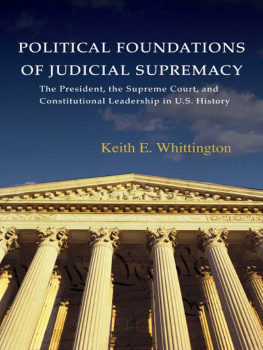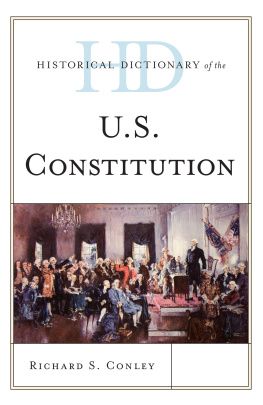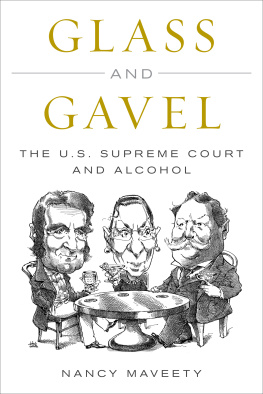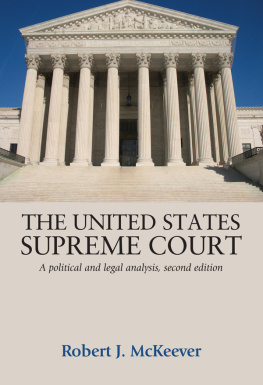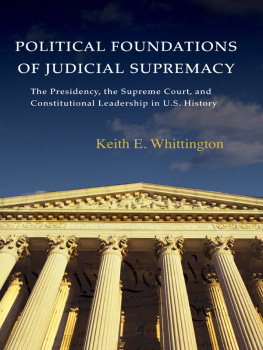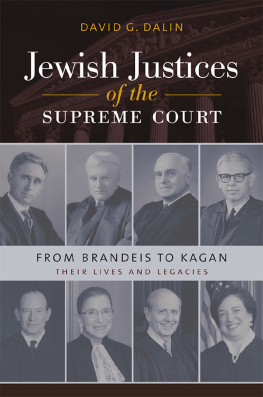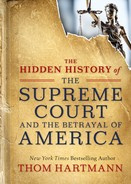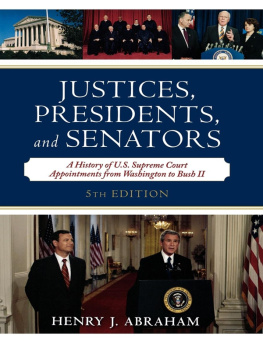Political Foundations of Judicial Supremacy
PRINCETON STUDIES IN AMERICAN POLITICS
Historical, International, and Comparative Perspectives
Ira Katznelson, Martin Shefter, and Theda Skocpol, series editors
A list of titles in this series appears at the back of the book
Political Foundations
of Judicial Supremacy
THE PRESIDENCY, THE SUPREME
COURT, AND CONSTITUTIONAL
LEADERSHIP IN U.S. HISTORY
Keith E. Whittington
PRINCETON UNIVERSITY PRESS
PRINCETON AND OXFORD
Copyright 2007 by Princeton University Press
Published by Princeton University Press, 41 William Street, Princeton, New Jersey 08540
In the United Kingdom: Princeton University Press, 3 Market Place,
Woodstock, Oxfordshire OX20 1SY
All Rights Reserved
Library of Congress Cataloging-in-Publication Data
Whittington, Keith E.
Political foundations of judicial supremacy : the presidency,
the Supreme
Court, and constitutional leadership in U.S. history / Keith E. Whittington.
p. cm. (Princeton studies in American politics)
Includes index.
eISBN: 978-1-40082-775-6
1. United States. Supreme Court. 2. Judicial reviewUnited States.
3. Political questions and judicial power. I. Title.
KF8748.W48 2007
347.7312dc22
2006022598
British Library Cataloging-in-Publication Data is available
This book has been composed in Sabon
Printed on acid-free paper.
pup.princeton.edu
Printed in the United States of America
1 3 5 7 9 10 8 6 4 2
For Taylor and Jimmy
Whoever hath an absolute authority to interpret anywritten or spoken laws, it is he who is truly the lawgiver,to all intents and purposes, and not that person who first wrote or spoke them.
Bishop Benjamin Hoadly, Sermon
Preached Before King George I
It is emphatically the province and duty of the judicial department to say what the law is.
Chief Justice John Marshall,
Marbury v. Madison
Contents
Preface
THIS IS A BOOK ABOUT the authority of the judiciary, and particularly the Supreme Court, to determine the meaning of the Constitution. It seeks to understand why the judiciary has that authority and looks for the answer in the incentives facing the individuals occupying the various institutions of government. Judicial supremacy largely consists of the ability of the Supreme Court to erase the distinction between its own opinions interpreting the Constitution and the actual Constitution itself. The Court claims the authority not only to look into the meaning of the Constitution as a guide to the justices own actions, but also and more importantly to say what the Constitution means, for themselves and for everyone else. Political leaders, and most importantly presidents, have generally been willing to lend their support to those sorts of claims by the Court.
The book is secondarily about departmentalism, the Jeffersonian idea that each branch of government has an equal authority and responsibility to interpret the Constitution when performing its own duties. Conceptually and historically, departmentalism has been the primary alternative to judicial supremacy. For the departmentalist, the Courts interpretations of the Constitution might be persuasive or adequate, but the Court has no special institutional authority to say what the Constitution means. The judiciary is one institution among many that is trying to get the Constitution right, but the other branches of government have no responsibility to take the Courts reading of the Constitution as being the same as the Constitution itself. Departmentalism has enjoyed moments of prominence in American constitutional thought and practice, but most political leaders have eschewed this kind of independent responsibility for reading the Constitution. Presidents and political leaders have generally preferred that the Court take the responsibility for securing constitutional fidelity.
In examining the development of the judicial authority to interpret the Constitution over the course of American historythe political foundations of judicial supremacythe book focuses particularly on the relationship between the president and the Supreme Court and touches on a variety of broader concerns, such as the politics of the exercise of judicial review and the bases for judicial independence. It is not a history of judicial review or constitutional law per se. Likewise, it does not attempt to provide a comprehensive treatment of the relationship between the president and the Supreme Court. As a consequence, some notable episodes of judicial-presidential interactionsuch as the Supreme Courts review of President Harry Trumans steel mill seizure during the Korean Warare left unaddressed when they do not shed additional light on the problem of the judicial authority to interpret the Constitution (an authority that Truman never questioned). The central concern of the book is with why politicians have been so eager to anoint the judges as the ultimate interpreters of the Constitution, a mantle that judges have been only too happy to accept.
This book has been in gestation for longer than I once expected. One consequence is that I have benefited from the support and conversation of many colleagues and institutions during the time that I have been thinking about issues relating to this book, and it is unlikely that I can adequately acknowledge them all. Bits and pieces of work relating to this book have been presented at a number of workshops, conferences, and colloquia over the last few years, and I appreciate greatly those opportunities to work out these ideas and the many participants who prodded me to work on them some more. I am particularly thankful for those gluttons for punishment who have listened to and read pieces and versions of this project through much of its development and who have been particularly generous with their time and attention, and whose own scholarship has often deepened my own thinking on these issues. They include Jack Balkin, Willie Forbath, Barry Friedman, Paul Frymer, Howard Gillman, Mark Graber, Ken Kersch, Larry Kramer, Sandy Levinson, Andrew Polsky, Scot Powe, Corey Robin, Reva Siegel, Stephen Skowronek, Mark Tushnet, and my colleagues at Princeton University. I also appreciate the support of the American Council of Learned Societies, the John M. Olin Foundation, the University of Texas Law School, the James Madison Program in American Ideals and Institutions, and Princeton University during the time I was working on this project. Some materials in this book are drawn from work previously published in Polity (vol. 33, no. 3, Spring 2001, pp. 36595), the American Political Science Review (vol. 99, no. 4, November 2005, pp. 58396), and Constitutional Politics (Princeton University Press, 2001) and are used here by permission.
I particularly appreciate the patience of my family as I worked on this project, especially since I often tested that patience. I will always associate this book with events that interceded during the time that I was working on it. Just when I thought I was about to begin this project, my daughter was born. Just when I thought I was about to work on this project in earnest, her grandfather was killed in the destruction of the World Trade Center. They did not share enough time together, and this book is dedicated to them.
ONE
The Politics of Constitutional Meaning
THE CONSTITUTION IS OFTEN thought to transcend our current disagreements and to have settled our fundamental political arguments. Its text embodies our most fundamental commitments, those things about which we no longer disagree, such as the content of our self-evident truths and unalienable rights. The Founding constituted order out of chaos, setting an authoritative higher law over the discord of politics. We may understand the meaning of that law differently than did those who framed it, but the Constitution remains a source of determinate answers to even our hardest political questions.

